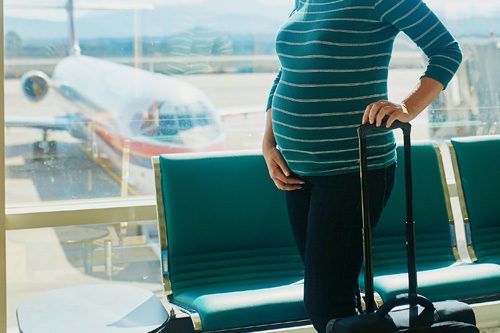9 Tips for Traveling While Pregnant

1. Check in with your doctor before traveling.
Travel is not recommended for those with certain complications, such as preeclampsia, preterm labor, or pre-labor rupture of membranes (PROM).
According to Dr. Simmons, there may be slightly higher risk associated with traveling in the first trimester (when there is a greater risk of bleeding) and the third trimester (when you’re closer to delivery). Most doctors advise a pregnant person not to fly by commercial flight after 36 weeks of pregnancy. In fact, most airlines restrict air travel for pregnant people if they are close to their due date. “As one approaches their due date, the risk of labor exists, and medical care in flight is limited or not available at all,” says Dr. Simmons.
2. Plan for unexpected situations.
Locate the closest obstetric healthcare provider and hospital, regardless of where you’re traveling. “When traveling domestically and internationally, you should ensure that there are options for obstetric care near your destination so that you have a place to go if you experience unexpected symptoms related to your pregnancy while traveling,” says Dr. Simmons.
3. Stay up to date on vaccinations.
Make sure you’re up to date on your flu and COVID-19 vaccines. If you plan to travel internationally, keep in mind that some countries require specific vaccines. While some vaccines are safe during pregnancy, others may not be. “Communicate with your provider as to what vaccines are recommended based on the country to which you plan to travel,” says Dr. Simmons.
4. Take extra precautions when traveling internationally.
It’s best to avoid areas with a high risk of infectious diseases — such as malaria or Zika, two mosquito-borne diseases. Check the Centers for Disease Control and Prevention (CDC) website for current information on countries where Zika and malaria are reported. Dr. Simmons reminds pregnant people that “the main way to mitigate risk with regard to malaria and Zika is to avoid infection altogether.”
If you absolutely must travel to areas where malaria and Zika are reported, you will need to use long-acting insect repellents that are safe for use while pregnant, like EPA-registered bug spray with DEET, picaridin, IR3535, or oil of lemon eucalyptus. Wear long-sleeved shirts and pants to protect against mosquito bites. If you’re going to a malaria-endemic area, your doctor will prescribe anti-malarial pills that are safe during pregnancy.
If you’re in a country where tap water is unsafe to drink, remember to stick with bottled water — even for things like brushing your teeth — to reduce the risk of gastrointestinal (GI) infection.
5. Wear your seat belt low and snug across your hips, not over your belly.
“For comfort and safety, avoid placing your seat belt on top of your pregnant abdomen,” says Dr. Simmons. It should be worn under your belly, just above your hips.
6. If you’re on a long flight or long car ride, get up and move often to help prevent blood clots.
During pregnancy, you are at an increased risk of developing what is called deep vein thrombosis (blood clots in deep veins in the body, like in the legs). Sitting for too long, as during a car or plane ride, can exacerbate blood clots. “Avoid sitting or standing in one position for extended periods,” explains Dr. Simmons. Anything you can do to improve blood flow helps. For flights, stand and walk up and down the aisle of the plane every hour. Choosing an aisle seat may make it easier to get up often. For long car rides, try and stop every hour to stretch your legs. If you can’t get up and walk around, “even calf raises in your seat help with circulation when you are sedentary during travel,” says Dr. Simmons.
“Wearing compression socks is another way to promote circulation while on a long trip,” adds Dr. Simmons. These tight-fitting socks reach up to the knees and help with blood flow and circulation.
